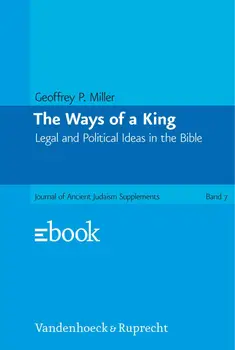Geoffrey P. Miller argues that the narratives from Genesis to Second Kings present a sophisticated argument for political obligation and for limited monarchy as the best form of government. The Hebrew Bible, in this sense, can be considered as one of the earliest political philosopies of the western world.The Garden of Eden story identifies revelation, consent, utopia, natural law, ownership, power, patriarchy, and justice as bases for political obligation. The stories of life after the expulsion from Eden argue that government and law are essential for a decent life. The Genesis narratives recognize patriarchal authority but also identifies limits based on kinship, higher authority and power. The book of Exodus introduces the topic of political authority, arguing that nationhood strictly dominates over other forms of political organization. The Sinai narratives explore two important sources of authority: revelation and consent of the governed. The book of Joshua presents a theory of sovereignty conceived of as the exclusive and absolute control over territory. The book of Judges examines two types of national government: military rule and confederacy. It argues that military rule is inappropriate for peacetime conditions and that the confederate form is not strong enough to deliver the benefits of nationhood. The books of Samuel and Kings consider theocracy and monarchy. The bible endorses monarchy as the best available form of government provided that the king is constrained by appropriate checks and balances. Contrary to the view of some scholars, no text from Genesis to Second Kings disapproves of monarchy as a form of government.

Light Against Darkness : Dualism in Ancient Mediterranean Religion and the Contemporary World
book
Biblical Quotations and Allusions in Second Temple Jewish Literature
Armin Lange, Matthias Weigold
book
Between Text and Text : The Hermeneutics of Intertextuality in Ancient Cultures and Their Afterlife in Medieval and Modern Times
book
Between Symbolism and Realism : The Use of Symbolic and Non-Symbolic Language in Ancient Jewish Apocalypses 333-63 B.C.E
Bennie H. Reynolds Reynolds
book
Between Cooperation and Hostility : Multiple Identities in Ancient Judaism and the Interaction with Foreign Powers
book
"See, I will bring a scroll recounting what befell me" (Ps 40:8) : Epigraphy and Daily Life from the Bible to the Talmud
book
Religious Competition in the Third Century CE: Jews, Christians, and the Greco-Roman World
book
Exploring the Dead Sea Scrolls : Archaeology and Literature of the Qumran Caves
Hanan Eshel
book
The Faces of Torah : Studies in the Texts and Contexts of Ancient Judaism in Honor of Steven Fraade
book
"You Shall Not Kill" : The Prohibition of Killing in Ancient Religions and Cultures
book
Institutionalized Routine Prayers at Qumran: Fact or Assumption?
Paul Heger
book
